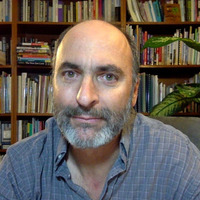
Antonio Lopez
Antonio Lopez, Ph.D. has a research focus on bridging sustainability with media literacy. He is an experienced curriculum designer, educator, trainer, theorist, researcher and public speaker. He has written numerous academic articles, essays and books. His most recent book is Greening Media Education: Bridging Media Literacy with Green Cultural Citizenship (Peter Lang). He is currently Chair and Associate Professor of Communications and Media Studies at John Cabot University in Rome, Italy.
less
Related Authors
Adrian Ivakhiv
Simon Fraser University
JEFF SHARE
University of California, Los Angeles
Alenda Chang
University of Connecticut
Alejandro Artopoulos
Universidad de San Andres - Argentina
Alva Markelius
University of Cambridge
James Muldoon
University of Essex
Boxi Wu
University of Oxford
InterestsView All (19)








Uploads
Books by Antonio Lopez
Ecomedia Literacy offers a focused and practical guide to integrate the relationship between media and the environment—ecomedia—into media education. It enables media teachers to ‘green’ their pedagogy by providing essential tools and approaches that can be applied in the classroom.
Media are an essential feature of our planetary ecosystem emergency, contributing to both the problem and solution to climate chaos, biodiversity loss, ocean acidification, deforestation, water contamination, and so on. Offering a clear theoretical framework and suggested curriculum guide, Antonio Lopez provides key resources that will enable media educators to apply ecomedia concepts into their curricula. By reconceptualizing media education, this book connects ecology, environmental communication, ecomedia studies, environmental humanities, and ecoliteracy to bridge media literacy and education for sustainability.
Ecomedia Literacy is an essential read for educators and scholars in the areas of media literacy, media and communication, media and cultural studies, environmental humanities, and environmental studies.
Ecomedia Literacy is designed to be proactive, providing tools and approaches that can be applied in a variety of learning environments.
A practical guide for educators of media studies, cultural studies and digital humanities to incorporate ecomedia concepts into their curriculum and teaching methods.
Provides in-depth discussion of “ecomedia” (the relationship between media and environment).
Features a theoretical framework, curriculum structure, and lesson guides for specific activities and curriculum design.
Makes meaningful connections to develop a sense of purpose by synthesizing the domains of digital and living systems through an experiential approach to learning.
Promotes skills necessary for environmental challenges, include self-reflection, critical analysis, systems thinking, creativity, and visualization; and more traditional skills like literacy of media, information and technology.
Integrates concepts from education for sustainability, such as cultural preservation and transformation; responsible green citizenship; the dynamics of systems and change; sustainable economics; healthy commons natural laws and ecological principles; inventing and affecting the future; a sense of place.
Develops a theoretical approach that reimagines communication and media theories.
Explores an ecomedia literacy curriculum heuristic called the “ecomediasphere.”
In order to create a more sustainable media ecosystem—just like the preservation of organic ecosystems—we must reconnect our daily media activities to their impact on others and the environment. To become “organic media practitioners,” we must become aware of the impact of media use on the environment; recognize media’s influence on our perception of time, space, and place; understand media’s interdependence with the global economy; be conscious of media’s interaction with cultural beliefs; and develop an ethical framework in order to act upon these understandings. Above all, Lopez calls for media producers and consumers alike to bring a sense of ritual and collaboration back to the process of communication, utilizing collective intelligence and supporting a new culture of participation. Containing both wide-reaching analysis and practical tips for more conscious media use, The Media Ecosystem is designed for all those who seek a more sustainable future."
Mediacology proposes a design-for-pattern approach called “Media Permaculture,” which restructures media literacy to be in sync with new media practices connected with sustainability and the perceptual functions of the right brain hemisphere. In the same way that permaculture approaches gardening by establishing the natural parameters of its ecological niche, Media Permaculture explores the individual’s “mediacological niche” in the context of knowledge communities. By applying bioregional thinking to the symbolic order, Media Permaculture redresses the standard one-size-fits-all literacy model by taking into account diverse cognitive strategies and emerging convergence media practices.
Drawing on his extensive experience as a grassroots mediamaker and time spent teaching media at Native American schools, Antonio Lopez applies a practical knowledge of alternative media, crosscultural communication and ecology to build a meaningful theory of media education.
Papers by Antonio Lopez
Ecomedia Literacy offers a focused and practical guide to integrate the relationship between media and the environment—ecomedia—into media education. It enables media teachers to ‘green’ their pedagogy by providing essential tools and approaches that can be applied in the classroom.
Media are an essential feature of our planetary ecosystem emergency, contributing to both the problem and solution to climate chaos, biodiversity loss, ocean acidification, deforestation, water contamination, and so on. Offering a clear theoretical framework and suggested curriculum guide, Antonio Lopez provides key resources that will enable media educators to apply ecomedia concepts into their curricula. By reconceptualizing media education, this book connects ecology, environmental communication, ecomedia studies, environmental humanities, and ecoliteracy to bridge media literacy and education for sustainability.
Ecomedia Literacy is an essential read for educators and scholars in the areas of media literacy, media and communication, media and cultural studies, environmental humanities, and environmental studies.
Ecomedia Literacy is designed to be proactive, providing tools and approaches that can be applied in a variety of learning environments.
A practical guide for educators of media studies, cultural studies and digital humanities to incorporate ecomedia concepts into their curriculum and teaching methods.
Provides in-depth discussion of “ecomedia” (the relationship between media and environment).
Features a theoretical framework, curriculum structure, and lesson guides for specific activities and curriculum design.
Makes meaningful connections to develop a sense of purpose by synthesizing the domains of digital and living systems through an experiential approach to learning.
Promotes skills necessary for environmental challenges, include self-reflection, critical analysis, systems thinking, creativity, and visualization; and more traditional skills like literacy of media, information and technology.
Integrates concepts from education for sustainability, such as cultural preservation and transformation; responsible green citizenship; the dynamics of systems and change; sustainable economics; healthy commons natural laws and ecological principles; inventing and affecting the future; a sense of place.
Develops a theoretical approach that reimagines communication and media theories.
Explores an ecomedia literacy curriculum heuristic called the “ecomediasphere.”
In order to create a more sustainable media ecosystem—just like the preservation of organic ecosystems—we must reconnect our daily media activities to their impact on others and the environment. To become “organic media practitioners,” we must become aware of the impact of media use on the environment; recognize media’s influence on our perception of time, space, and place; understand media’s interdependence with the global economy; be conscious of media’s interaction with cultural beliefs; and develop an ethical framework in order to act upon these understandings. Above all, Lopez calls for media producers and consumers alike to bring a sense of ritual and collaboration back to the process of communication, utilizing collective intelligence and supporting a new culture of participation. Containing both wide-reaching analysis and practical tips for more conscious media use, The Media Ecosystem is designed for all those who seek a more sustainable future."
Mediacology proposes a design-for-pattern approach called “Media Permaculture,” which restructures media literacy to be in sync with new media practices connected with sustainability and the perceptual functions of the right brain hemisphere. In the same way that permaculture approaches gardening by establishing the natural parameters of its ecological niche, Media Permaculture explores the individual’s “mediacological niche” in the context of knowledge communities. By applying bioregional thinking to the symbolic order, Media Permaculture redresses the standard one-size-fits-all literacy model by taking into account diverse cognitive strategies and emerging convergence media practices.
Drawing on his extensive experience as a grassroots mediamaker and time spent teaching media at Native American schools, Antonio Lopez applies a practical knowledge of alternative media, crosscultural communication and ecology to build a meaningful theory of media education.
food alternative in relation to more conventional fast food venues. Chipotle uses its media campaigns to educate consumers about opposing food production paradigms (local and family farming versus factory farming). However, some critics have argued that the campaign is misleading and that Chipotle’s sustainability practices are contradictory and ambiguous; its
marketing strategy could be considered to be an example of “greenwashing,” which is the practice of marketing unsustainable products as being positive for the environment. Drawing on media analysis techniques and ecocriticism, students critically assess in a written assignment (six to eight-page paper) the messaging Chipotle uses to promote its ethical and environmental food brand to explore environmental ideologies and ecological discourses. This assignment builds on five lessons: 1) media as environmental education; 2) environmental ideologies; 3) ecocriticism and environmental discourses; 4) food systems and marketing; and 5) greenwashing. The written assignment and lesson plan prompts students to evaluate Chipotle’s environmental claims, and to determine if its media campaigns can be reconciled with its actual business practices. In doing so students gain insights into how media act as a kind of environmental education (or “miseducation,” as the case may be).
To paraphrase a Native elder: any road will get you somewhere. The question for Native America is, where will the information highway take them? As Native Americans continue to face challenges from the legacy of colonialism, new media provide both an opportunity and crises in education. Standardized education policy such as No Child Left Behind and funding cuts in social services inadvertently impact Net access and Indian education, yet alternative programs and approaches exist. It is necessary that programs conceptualize new media learning strategies within a historical context by being sensitive to the political and cultural connotations of literacy and technology in Native American communities. By encouraging the use of new media as a tool for grassroots community media and locally relevant storytelling, this essay asks educators to consider an alternative epistemology that incorporates non-Western approaches to ecology and knowledge.
Keywords: Media Literacy; Deep Ecology; Environmental Communication; Cognitive Linguistics; Climate Change